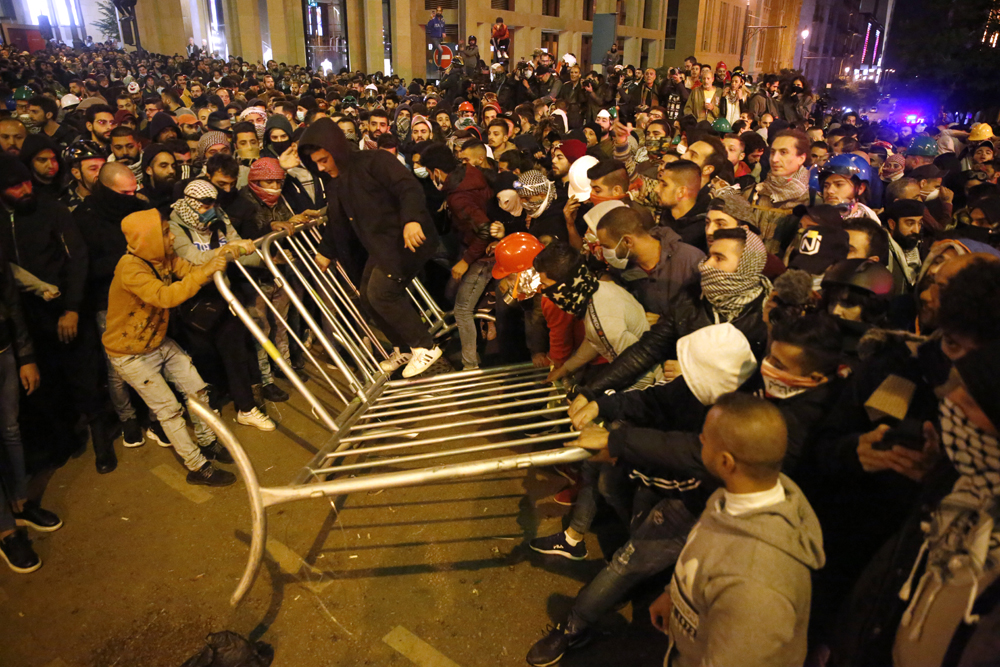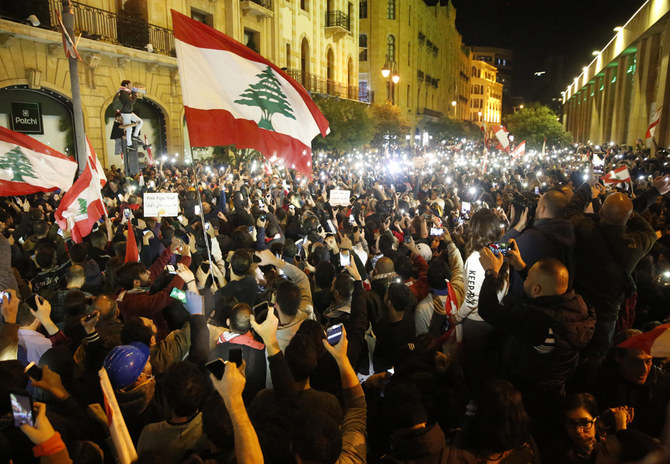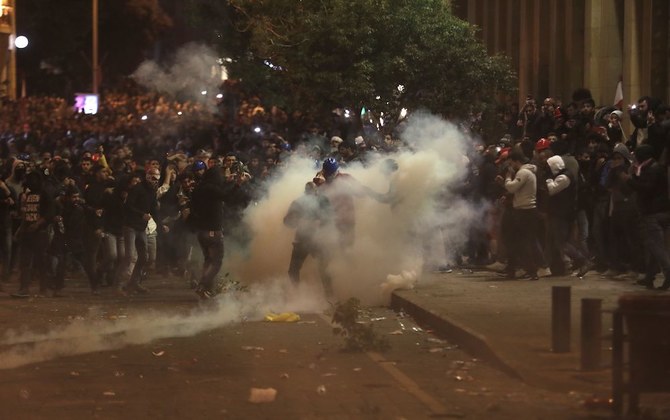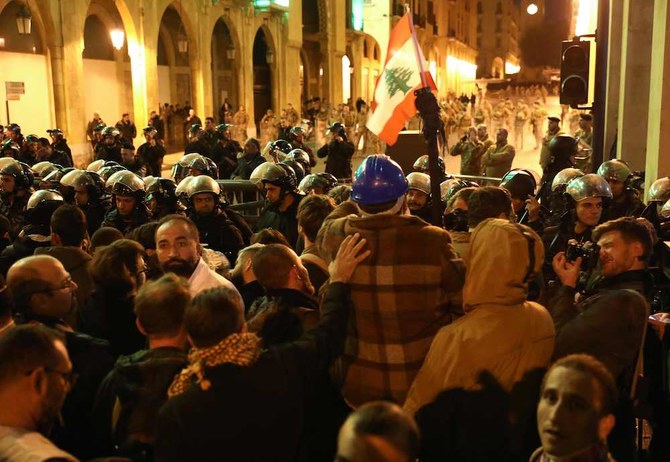BEIRUT: Thousands of Lebanese protesters took to the streets again on Sunday as an official investigation began into a 10-hour battle in Beirut the previous night.
At least 130 people were injured in the most violent crackdown on protesters since nationwide demonstrations began two months ago against government corruption and ineptitude.
Security forces fired tear gas and deployed water cannons throughout the night as downtown Beirut turned into a battleground. By morning, stones filled the streets, shop windows were broken and trees lay uprooted.
Witnesses saw masked men in civilian clothes mingling with security forces and attacking protesters. “There are parties trying to exploit the rightful protests to start a clash between the protesters and the security forces,” Interior Minister Raya El-Hassan said.
The minister said she viewed the violence “with concern, grief, and astonishment.”
“I have urged the leadership of the Internal Security Forces to conduct a quick and transparent investigation to identify those responsible,” she said.
Saturday night’s violence “was not caused by infiltrators, but the excessive violence of the security forces, who lacked security coordination,” social researcher Nizar Hassan told Arab News.

Anti-government protesters remove the fences that was divided between them and the riot police, during a protest near the parliament square, in downtown Beirut, Lebanon, on Dec. 15, 2019. (AP Photo/Hussein Malla)
“It is natural that those who are targeted by tear-gas bombs will respond by throwing stones,” he said.
Amnesty International’s Diala Haidar decried the “excessive use of force” in response to “overwhelmingly peaceful protest.”
“The intention was clearly to prevent protesters gathering,” she said, adding that masked men in civilian clothes joined security forces in “violently attacking protesters.”
The clashes lasted until the early hours of Sunday, with demonstrators chanting slogans against outgoing prime minister Saad Hariri, who stepped down on Oct: 29, and parliament’s veteran speaker Nabib Berri.
The names of various potential candidates to replace Hariri have been circulated in recent weeks but powerful political parties in the multi-confessional country have failed to agree on a new premier.
As protests resumed in Beirut on Sunday, political party offices in northern Lebanon were set on fire. Attackers broke the windows and torched the Future Movement office in the town of Kharibet Al-Jindi, and the rival Free Patriotic Movement offices in Jedidat Al-Juma were also smashed and burned.
The new violence comes on the eve of parliamentary consultations on Monday to name a new prime minister and form a government. Saad Hariri, caretaker prime minister since he resigned in October, is the prime candidate to resume office.
Presidency media bureau chief Rafic Shalala told Arab News: “The binding parliamentary consultations will still be held as scheduled. They will start at 10:30 on Monday morning, and PM Hariri is at the top of the list of MPs to be received by the president.”
The Free Patriotic Movement has said it would not participate in the formation of a government. Hezbollah and the Amal Movement support Hariri’s nomination as prime minister, but researcher Hassan told Arab News this was unlikely to be acceptable to protesters.
“Any government that does not meet the street’s demands will not pass,” he said.
“We want an independent rescue government. The street has toppled the names previously nominated to head the government, and it will impose its weight in this equation. Hariri will be toppled by the street, even if he wants to arrive on a tank.”
Last Sunday the Sunni Muslim establishment threw its support behind Hariri returning, further angering protesters.
Parliamentary consultations are due to begin Monday at 10:30 a.m. (0830 GMT).
The UN insisted on the importance of the talks, with its Lebanon coordinator Jan Kubis urging politicians to “act responsibly.”
“Tomorrow is the moment of truth. Either politicians will show at this critical moment of deep complex crisis they understand the needs of #Lebanon and its people and help steer a peaceful way forward, or that they remain captive of their traditional habits and attitudes,” Kubis tweeted.
Sunday’s demonstration in Beirut began peacefully with protesters waving Lebanese flags and chanting “Hariri will not return.”
“Change needs time and patience and we will not stop until we achieve our goals and remove this regime completely,” said 23-year-old protester Carla.
“We don’t want Hariri because he is a partner in (official) corruption,” she added.
“I am opposed to Hariri returning as head of the government and I don’t understand why they can’t find anyone else,” said Nour, a pharmacist.
“There are many competent people... who are independent,” she added.
The head of the Internal Security Forces, Brig. Imad Othman, spoke to protesters in Beirut Sunday, urging them to remain peaceful and let security forces carry out their duties unhindered.
The process of forming a government will take place as Lebanon’s debt-burdened economy has been sliding toward collapse.
The country is facing a dollar liquidity crisis, with banks limiting the withdrawal and transfer of the greenback, which has been selling for more than 2,000 Lebanese pounds on the parallel market for the first time since it was officially pegged at 1,507 in 1997.
The international community has urged a new cabinet to be formed swiftly to implement key economic reforms and unlock international aid.
French Foreign Minister Jean-Yves Le Drian on Sunday urged Lebanese leaders to push to resolve the crisis paralyzing the country, warning of a “dramatic situation.”






























